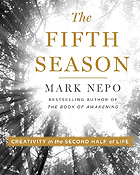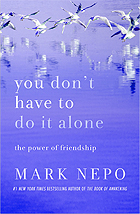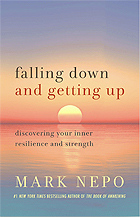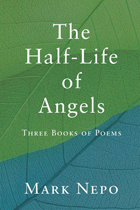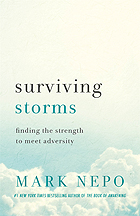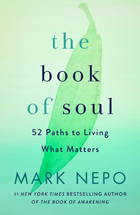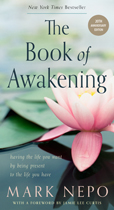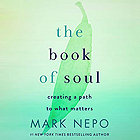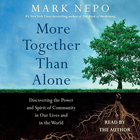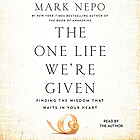
Reduced to Joy
VIVA EDITIONS, BERKELEY, CA
CITED BY SPIRITUALITY & PRACTICE AS ONE OF THE BEST SPIRITUAL BOOKS OF 2013
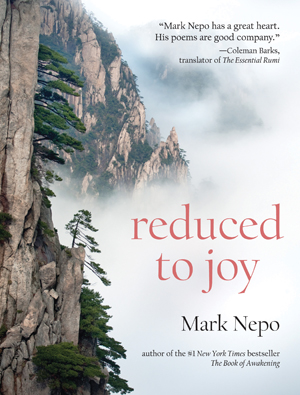

Six of Mark's poems from Reduced to Joy are featured on Oprah.com.
Please check them out - accompanied by beautiful slides.
"Reduced to Joy has many different kinds of poems, all of them clear, wise, beautifully put, spare. Mark Nepo has a great heart. His poems are good company."
— Coleman Barks, translator of The Essential Rumi
"Mark Nepo's poems in his new book, Reduced to Joy, reduce me first to grateful silence, and then to tears, and then to laughter, and then to praise. He joins a long tradition of truth-seeking, wild-hearted poets—Rumi, Walt Whitman, Emily Dickinson, Mary Oliver—and deserves a place in the center of the circle with them."
— Elizabeth Lesser, Cofounder, Omega Institute, author of Broken Open: How Difficult Times Can Help Us Grow
"Mark Nepo has a rare quality of writing, one that fills you up even as it drops you into emptiness. Through his sensibilities we touch what is human: he plucks at our heartstrings with naked candor and metaphorical mastery. Brilliant, profound and accessible, the poems in this collection are like precious treasures rising from the deep, glistening reminders of what really matters."
— Julie Clayton, New Consciousness Review
(Full Review)
"The title of the collection, Reduced to Joy, is a perfect representation of these fine works for there is joy to be found on every page, in every poem, through every word. This is a book worth owning and keeping and visiting and revisiting."
— Rosi Hollinbeck, San Francisco Book Review

Order the book from an online bookseller:
Amazon
Barnes & Noble
Books-a-Million
IndieBound

Pre-order the 6 CD Audio Learning Course from an online reseller:
Amazon
Barnes & Noble
Books-a-Million
Available as an audio learning course from Sounds True, October 2014
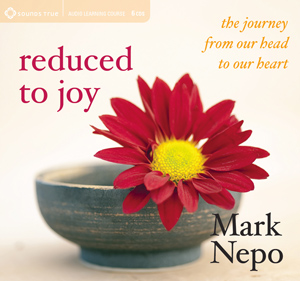

BOOK DESCRIPTION
Beloved as a poet, teacher, and storyteller, Mark Nepo, the New York Times bestselling
author of The Book of Awakening, has been called "one of the finest spiritual guides
of our time," "a consummate storyteller," and "an eloquent spiritual teacher."
His many books have been translated into more than twenty languages. Now
in his sixties, he is publishing Reduced to Joy, a book of seventy-three poems,
retrieved and shaped over the last thirteen years, about the nature of working
with what we're given till it wears us through to joy. About joy, Nepo says,
"Often, what keeps us from joy is the menacing assumption that life is happening
other than where we are." Of the book, he says, "Poetry is the well from which
all my books rise. It's where I always go to listen, always stunned by
what arrives. It's how I know the inner world. I bring these poems
back from the deep like shells from the sea that we can look at together."
Profound and accessible, Nepo's poems are tools for staying close to what matters.
POEMS FROM THE BOOK
SO MUCH IS CARRIED
(for Saba)
When just a pup, I took her into winter.
While Paul photographed the heavy snow,
she, having never run free, circled wildly,
her little nose caked with white.
She slipped and broke the ice. I can still
see her puppy face underwater, looking
for a way out, her tiny paws swatting
at the thick clear deep.
With no thought, I was waist high and
wet, sweeping her into the air. She flew
a good twelve feet and landed with a thud.
She shook and started to shiver. We rubbed
her down for two hours, blowing her with
an old hair dryer. I held her in my shirt,
near my heart, the whole way home.
I'm fourteen years and seven states away
and she has died. My first dog. I close
my eyes and there she is, grown,
sniffing the air in an open field,
smelling things I couldn't even sense.
How many times I've played that day
in the pond: her struggle underwater,
her drying on my chest.
How much that day has shaped my art:
always jumping in and sweeping what
has been baptized in the deep back
into the world, always holding it
near my heart. As if my life
depends on it.
THE SUBLIME DISTURBANCE
As the wind makes a different song
through the same tree as its branches
break, God makes finer and finer music
through the wearing down of our will.
WHERE IS GOD?
It's as if what is unbreakable—
the very pulse of life—waits for
everything else to be torn away,
and then in the bareness that
only silence and suffering and
great love can expose, it dares
to speak through us and to us.
It seems to say, if you want to last,
hold on to nothing. If you want
to know love, let in everything.
If you want to feel the presence
of everything, stop counting the
things that break along the way.

Reviews
"Please, open this book. Begin anywhere. Take your time. But know this: Mark Nepo will make you fall in love with the world. Again."
— Wayne Muller, author of A Life of Being, Having and Doing Enough , and Sabbath

"These poems touch the soul, reminding each of us what it means to be fully alive, to be surrounded by what is sacred. Allow them to reach under your skin, to where mystery is born into meaning."
— Llewellyn Vaughan-Lee Ph.D., Sufi teacher and author of Prayer of the Heart

"Oh! What a marvelous book. Mark Nepo's generous, vast poems restore readers to joy even before we finish reading them—musing upon single lines, images, stanzas—we feel it rising up again, that precious sense of YES. And completing them—we feel the rich trove of thinking and living so heartened and restored."
— Naomi Shihab Nye, author of Words Under the Words and 19 Varieties of Gazelle

"Rumi would have described this book of poems as a crystal chandelier—so many jewels, each like a treasure God has placed in the heart of Mark Nepo. If you already know Mark's work, you won't want to miss this collection. And if you have never had the pleasure of experiencing the world through Mark Nepo's eyes, begin with Reduced to Joy."
— Gayatri Naraine, author of Something Beyond Greatness

"By having, as he puts it, nothing to say, Mark Nepo says everything in this new book of poems. By showing us again and again what happens when one man is "completely at peace," we witness what is possible when we are "reduced to joy" by an honest life, and by poetry itself."
— Phil Cousineau, author of The Art of Pilgrimage and The Painted Word

"Nepo's voice, clear, resonant, and real, acts like the pointer on your heart's compass and helps you navigate your most joyful life."
— Mary Anne Radmacher, author of Lean Forward into Your Life and She

"Poems that have the power to transform your life both light up the mind and warm the heart as they strip your self of pretense and the impermanent. Mark Nepo's poems transmit those transfiguring experiences inside words of beauty. Nepo's poems should carry a warning label: 'These poems are dangerous to your false self.'"
— Rev. Ed Bacon, author of 8 Habits of Love; rector, All Saints Episcopal Church, Pasadena, California

"I am deeply moved by Mark Nepo's work, especially the healing power of the writing process he brings through to us all. His new Reduced to Joy cuts close to the bone with passages of pure beauty and raw honesty. I felt the stillness he wrote of, followed by a sense of peace. For this, I am grateful."
— Nina Lesowitz, author of Living Life as a Thank You

"Nepo makes simple, often overlooked things in life, meaningful—and the meaningful, but sometimes overly complex things, simple. This is a beautiful book of poems to deepen and nurture the soul with love and joy, even for those who have never read a poem in their life."
— Allen Klein, author of The Art of Living Joyfully

"In Reduced to Joy, Mark Nepo has written a love letter that speaks directly to the heart of the reader. He writes from the wisdom of experience—of having journeyed through two cancers. He gets to the essence of happiness, touching readers with his poetic passages and personal aha moments. He reminds us that in stillness, in embracing the mystery of life, and in embodying our birthright as mighty expressions of love, we are reduced to joy."
— Susyn Reeve, author of The Inspired Life: Unleashing Your Mind's Capacity for Joy

"In Reduced to Joy, Mark Nepo's powerful and poignant collection of life poems, we are reminded again of what it is to be truly alive. His poems inspire, connect, and encourage us to breathe in our own truth so that we can rediscover the peace and joy that is also present in each moment of our lives."
— Polly Campbell, author of Imperfect Spirituality: Extraordinary Enlightenment for Ordinary People

"Words placed so deliberately yet freely on the page, like Chinese brush strokes on silk, infuse this book with a spirit that can't be captured accurately in words… Nepo expresses truth… in words that inspire and uplift in a sustainable way."
— Anna Jedrziewski, Retailing Insight

"There are many memorable poems in this book. "Where Is God?" stopped us in our tracks with its mystical perspective. Nepo is an inveterate meaning-maker who has delved deeply into the wisdom traditions and the world's religions. In vivid imagery, he captures those connections and epiphanies which illuminate the human condition."
— Frederic and Mary Ann Brussat, Spirituality and Practice
(Full Review)

A CONVERSATION WITH MARK ABOUT HIS NEW BOOK OF POEMS, REDUCED TO JOY
QUESTION: What inspired you to write this book?
MN: Poems come slowly. They break surface like dolphin after long stretches of going
under. So writing a book of poems for me is different than writing my other books. I
have to sit when I'm able and try to make heart-sense of what life has been doing to me and with
me. Like wringing out a sponge, I squeeze what matters onto the page, let it dry, and see
what's there the next day. One by one, they gather into an instructive whole. All this
to say, that by trying to make sense of my own experience, I've discovered a theme to the journey,
that we are all reduced to joy, worn away of all excess. To survive this, we often need to
hold each other up in order to discover and return to what matters. This book explores these
essential relationships, which keep shaping me.
QUESTION: Can you speak about the nature of joy and what keeps us from it?
MN: For me, joy is different than happiness. While happiness is a fleeting mood, joy is
larger and more lasting than any one feeling. If each feeling is a wave of emotion, then
joy is the ocean that holds all feelings. As I get older, I'm coming to realize that joy
is central to our knowing peace. It's one deep way that we access Oneness. I'm also
beginning to see that joy is the hum of Oneness. It's the sensation of being connected
to life itself. Another way to speak of joy is to say that it's the reward for facing
our experience. Often, what keeps us from joy is the menacing assumption that life is
happening other than where we are. So we are always leaving, running from or running
to. What keeps us from joy, then, is often not being where we are and not valuing what is before us.
QUESTION: These poems are gathered from the last thirteen years of your life. How would you describe your journey over these years and how you've changed or grown during this time?
MN: With each hardship and loss, friendships matter more and not just with people, but with
nature and time and with life itself. This last decade has made me more vulnerable and
stronger at the same time. I feel there is less between me and what I experience. I think
I've been reduced more and more to what is essential, less able to pretend or look away.
I still get tripped up by fear and worry and at times forget where I've been and who I am.
But this is all part of the endless journey. I've become a student of things as they are
and this has led me to the astonishing guidance that all things are true. I simply have to
keep my heart open long enough to discover how.
QUESTION: You talk a lot about "working with what we're given" as a way to discover a meaningful life. Can you talk more about this?
MN: Try as we do to resist what we're given, this is only doorway to truth. Not
all that we're given is difficult. There are many blessings and gentle surprises
along the way. But we all waste too much time and energy either denying where we
find ourselves or fighting where we find ourselves. When what's before us is always
a shy teacher insisting on our attention. I love the great Czech poet Vaclav
Havel's definition of hope as "not the conviction that something will turn out well,
but the certainty that something makes sense, regardless of how it turns out." Working
with what we're given is the mirror to uncovering our true nature.
QUESTION: The final section of the book is called "Falling in Love with the World." What does this mean and how do we go about living this way?
MN: When we can find the courage and support to be where we are, completely, when
we can find the wherewithal to meet what we're given honestly, when we can see our
feelings all the way through, then we open ourselves to an inner form of gravity
that has us lean into life rather than pull away. This leaning into life with
a fragile bareness awakens us to the tender irreplaceable side of life. It
is here that we can't help but fall in love with the world, in spite of its
harshness and unpredictability.
QUESTION: In one of your poems, you refer to "the messy art of facing things" and how we sometimes hurt those closest to us. Why is facing things necessary and how can we go about doing it?
MN: The art of facing things is necessary because without it, we replay our
struggles on everything around us. So if you want to lessen the amount
of violence in the world, the first thing you can do is to commit to facing
what is yours to face. When we don't own what life brings us, we project
our pain onto others. I've found over time that the first way for me to
gather the courage to face my life is to renew my foundational belief that I
will survive the discomfort of psychological and emotional pain. In fact,
avoiding inner pain only intensifies it. Somehow I need to risk being reshaped
by what I face. And the art of facing things isn't just difficult and messy.
It's also beautiful and tender. Without facing things and each other, intimacy is
not possible. No one knows the secret path to all this. Another reason we need each other.
QUESTION: In another poem, you look at what it means to know something by heart. Can you explain this and why it's important?
MN:
[Excerpt from poem]: To graduate into the world, we are
required to memorize practical and odd things: the number
of feet in a mile, the year Henry VIII beheaded Anne Boleyn,
the degree at which clouds will freeze their rain. But since
death is the mirror we eventually move through, let's stop
carrying the things we repeat and start holding things
with our eyes.
I've been struck by how we're trained away from direct, unscripted living.
It's interesting, as I mention in the poem, that "to know by heart" has been reduced
to memorization. When the original sense of knowing something by heart is to be
touched by what we meet so completely that our compassion is awakened. When we
memorize things, we live in our heads and tend to track life rather than enter it.
To truly know something or someone by heart means we will, no doubt, be changed for the
experience. And ultimately, as prepared as we try to be, the goal of life is to be
surprised into a greater depth of connection and being. Ironically, to be touched
by life, we often have to put down what we know in order to be refreshed and re-vitalized by what we don't know.
QUESTION: Finally, what do you hope readers will take with them from REDUCED TO JOY?
MN: My hope is that the poems in this book will serve as a threshold to an underlying
connection to the greater life we are all a part of. I hope the book will be a
resource for the reader when faced with the difficulties of living. I hope the
poems will confirm that, no matter the struggle you find yourself in, you are not
alone. May these poems be honest companions on the journey to joy.
|







